Business Law Assignment: Contract Validity and Breaches
VerifiedAdded on 2022/08/23
|7
|1715
|18
Homework Assignment
AI Summary
This assignment analyzes the validity of contractual agreements in a business law context, focusing on a scenario involving a bakery owner named Rebecca. The paper examines three potential contracts: one with Lucy, who was promised free cupcakes; another with Jack, who owed Rebecca money; and a third with Steph, a food critic. It discusses the essential elements of a valid contract, including offer and acceptance, intention to create legal relations, consideration, and capacity. The analysis determines whether each agreement constitutes a valid contract and whether any breaches occurred. The paper concludes by summarizing the key principles of contract law and their application to the given scenarios, highlighting the importance of fulfilling contractual obligations to avoid liability for damages. The paper references relevant case law to support its arguments, such as Smith v Hughes, Balfour v Balfour, and Carlill v Carbolic Smoke Ball Company.
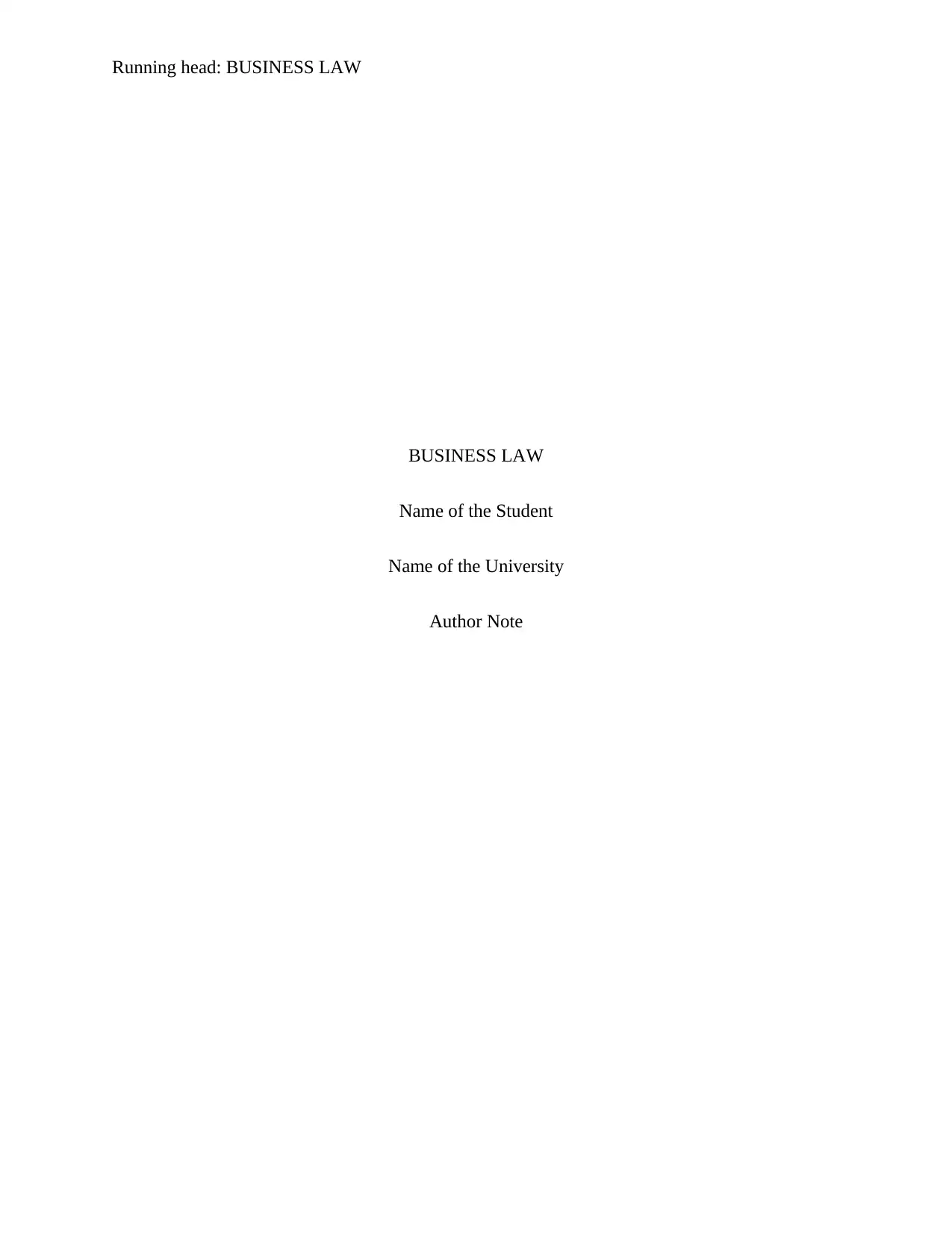
Running head: BUSINESS LAW
BUSINESS LAW
Name of the Student
Name of the University
Author Note
BUSINESS LAW
Name of the Student
Name of the University
Author Note
Paraphrase This Document
Need a fresh take? Get an instant paraphrase of this document with our AI Paraphraser
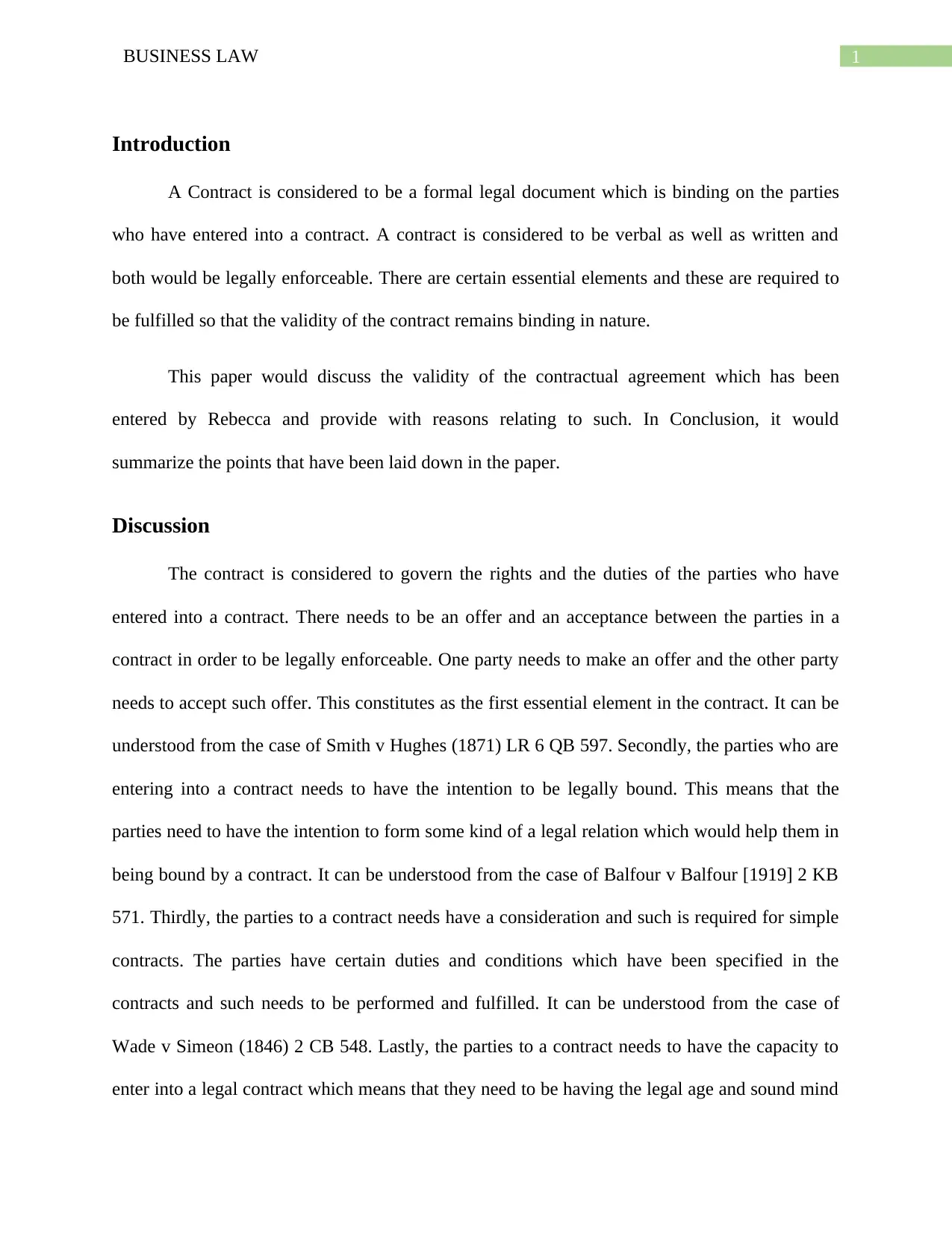
1BUSINESS LAW
Introduction
A Contract is considered to be a formal legal document which is binding on the parties
who have entered into a contract. A contract is considered to be verbal as well as written and
both would be legally enforceable. There are certain essential elements and these are required to
be fulfilled so that the validity of the contract remains binding in nature.
This paper would discuss the validity of the contractual agreement which has been
entered by Rebecca and provide with reasons relating to such. In Conclusion, it would
summarize the points that have been laid down in the paper.
Discussion
The contract is considered to govern the rights and the duties of the parties who have
entered into a contract. There needs to be an offer and an acceptance between the parties in a
contract in order to be legally enforceable. One party needs to make an offer and the other party
needs to accept such offer. This constitutes as the first essential element in the contract. It can be
understood from the case of Smith v Hughes (1871) LR 6 QB 597. Secondly, the parties who are
entering into a contract needs to have the intention to be legally bound. This means that the
parties need to have the intention to form some kind of a legal relation which would help them in
being bound by a contract. It can be understood from the case of Balfour v Balfour [1919] 2 KB
571. Thirdly, the parties to a contract needs have a consideration and such is required for simple
contracts. The parties have certain duties and conditions which have been specified in the
contracts and such needs to be performed and fulfilled. It can be understood from the case of
Wade v Simeon (1846) 2 CB 548. Lastly, the parties to a contract needs to have the capacity to
enter into a legal contract which means that they need to be having the legal age and sound mind
Introduction
A Contract is considered to be a formal legal document which is binding on the parties
who have entered into a contract. A contract is considered to be verbal as well as written and
both would be legally enforceable. There are certain essential elements and these are required to
be fulfilled so that the validity of the contract remains binding in nature.
This paper would discuss the validity of the contractual agreement which has been
entered by Rebecca and provide with reasons relating to such. In Conclusion, it would
summarize the points that have been laid down in the paper.
Discussion
The contract is considered to govern the rights and the duties of the parties who have
entered into a contract. There needs to be an offer and an acceptance between the parties in a
contract in order to be legally enforceable. One party needs to make an offer and the other party
needs to accept such offer. This constitutes as the first essential element in the contract. It can be
understood from the case of Smith v Hughes (1871) LR 6 QB 597. Secondly, the parties who are
entering into a contract needs to have the intention to be legally bound. This means that the
parties need to have the intention to form some kind of a legal relation which would help them in
being bound by a contract. It can be understood from the case of Balfour v Balfour [1919] 2 KB
571. Thirdly, the parties to a contract needs have a consideration and such is required for simple
contracts. The parties have certain duties and conditions which have been specified in the
contracts and such needs to be performed and fulfilled. It can be understood from the case of
Wade v Simeon (1846) 2 CB 548. Lastly, the parties to a contract needs to have the capacity to
enter into a legal contract which means that they need to be having the legal age and sound mind
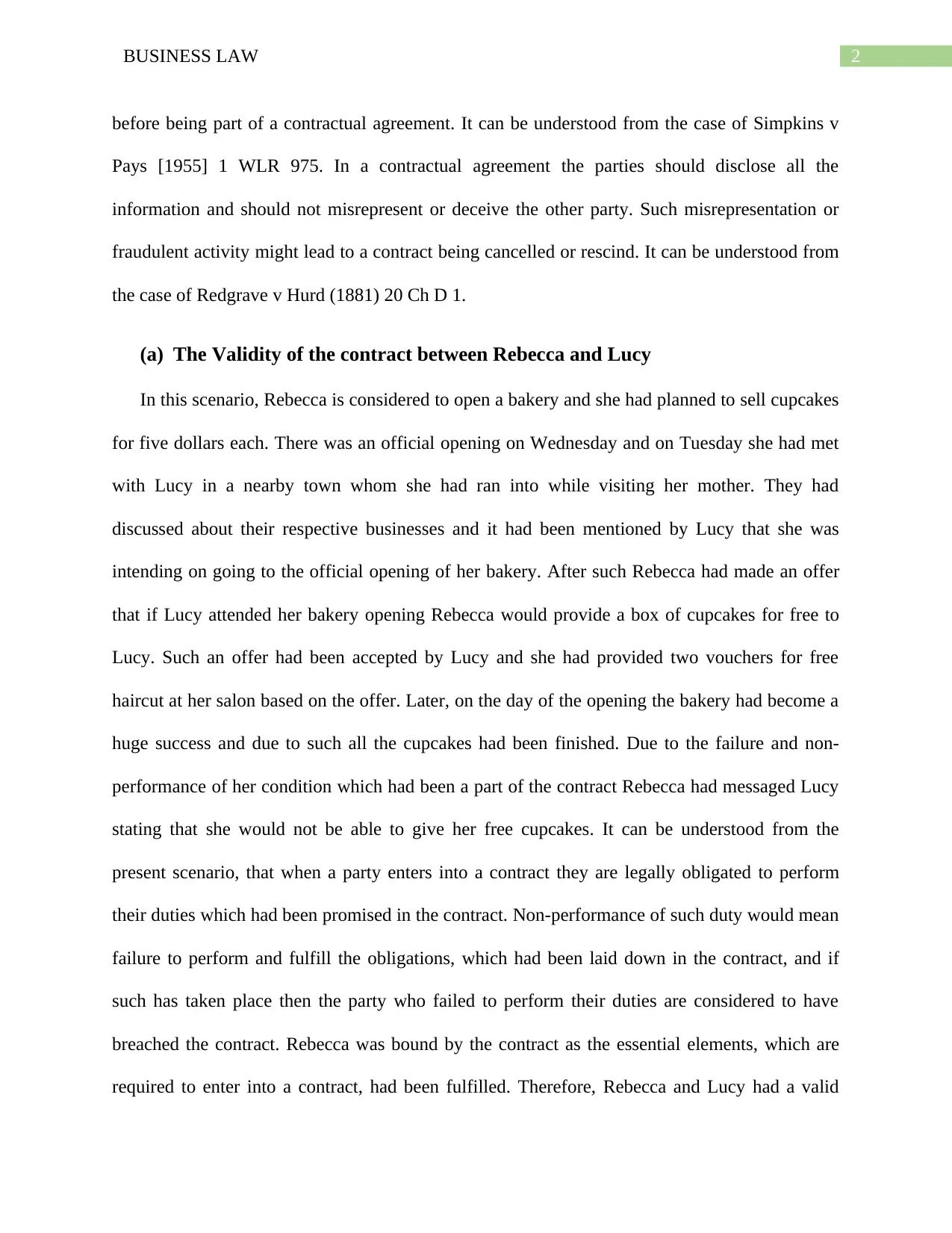
2BUSINESS LAW
before being part of a contractual agreement. It can be understood from the case of Simpkins v
Pays [1955] 1 WLR 975. In a contractual agreement the parties should disclose all the
information and should not misrepresent or deceive the other party. Such misrepresentation or
fraudulent activity might lead to a contract being cancelled or rescind. It can be understood from
the case of Redgrave v Hurd (1881) 20 Ch D 1.
(a) The Validity of the contract between Rebecca and Lucy
In this scenario, Rebecca is considered to open a bakery and she had planned to sell cupcakes
for five dollars each. There was an official opening on Wednesday and on Tuesday she had met
with Lucy in a nearby town whom she had ran into while visiting her mother. They had
discussed about their respective businesses and it had been mentioned by Lucy that she was
intending on going to the official opening of her bakery. After such Rebecca had made an offer
that if Lucy attended her bakery opening Rebecca would provide a box of cupcakes for free to
Lucy. Such an offer had been accepted by Lucy and she had provided two vouchers for free
haircut at her salon based on the offer. Later, on the day of the opening the bakery had become a
huge success and due to such all the cupcakes had been finished. Due to the failure and non-
performance of her condition which had been a part of the contract Rebecca had messaged Lucy
stating that she would not be able to give her free cupcakes. It can be understood from the
present scenario, that when a party enters into a contract they are legally obligated to perform
their duties which had been promised in the contract. Non-performance of such duty would mean
failure to perform and fulfill the obligations, which had been laid down in the contract, and if
such has taken place then the party who failed to perform their duties are considered to have
breached the contract. Rebecca was bound by the contract as the essential elements, which are
required to enter into a contract, had been fulfilled. Therefore, Rebecca and Lucy had a valid
before being part of a contractual agreement. It can be understood from the case of Simpkins v
Pays [1955] 1 WLR 975. In a contractual agreement the parties should disclose all the
information and should not misrepresent or deceive the other party. Such misrepresentation or
fraudulent activity might lead to a contract being cancelled or rescind. It can be understood from
the case of Redgrave v Hurd (1881) 20 Ch D 1.
(a) The Validity of the contract between Rebecca and Lucy
In this scenario, Rebecca is considered to open a bakery and she had planned to sell cupcakes
for five dollars each. There was an official opening on Wednesday and on Tuesday she had met
with Lucy in a nearby town whom she had ran into while visiting her mother. They had
discussed about their respective businesses and it had been mentioned by Lucy that she was
intending on going to the official opening of her bakery. After such Rebecca had made an offer
that if Lucy attended her bakery opening Rebecca would provide a box of cupcakes for free to
Lucy. Such an offer had been accepted by Lucy and she had provided two vouchers for free
haircut at her salon based on the offer. Later, on the day of the opening the bakery had become a
huge success and due to such all the cupcakes had been finished. Due to the failure and non-
performance of her condition which had been a part of the contract Rebecca had messaged Lucy
stating that she would not be able to give her free cupcakes. It can be understood from the
present scenario, that when a party enters into a contract they are legally obligated to perform
their duties which had been promised in the contract. Non-performance of such duty would mean
failure to perform and fulfill the obligations, which had been laid down in the contract, and if
such has taken place then the party who failed to perform their duties are considered to have
breached the contract. Rebecca was bound by the contract as the essential elements, which are
required to enter into a contract, had been fulfilled. Therefore, Rebecca and Lucy had a valid
⊘ This is a preview!⊘
Do you want full access?
Subscribe today to unlock all pages.

Trusted by 1+ million students worldwide
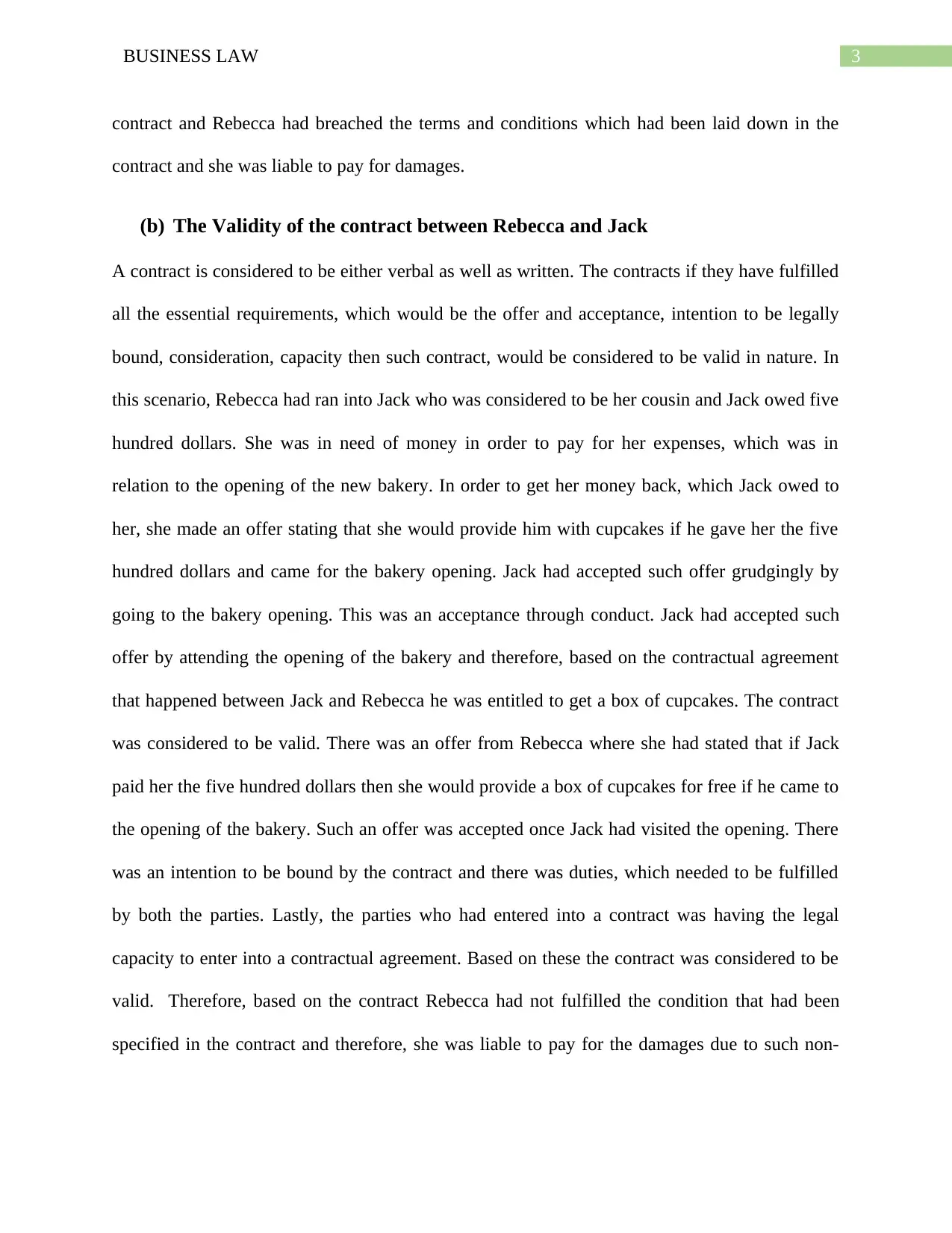
3BUSINESS LAW
contract and Rebecca had breached the terms and conditions which had been laid down in the
contract and she was liable to pay for damages.
(b) The Validity of the contract between Rebecca and Jack
A contract is considered to be either verbal as well as written. The contracts if they have fulfilled
all the essential requirements, which would be the offer and acceptance, intention to be legally
bound, consideration, capacity then such contract, would be considered to be valid in nature. In
this scenario, Rebecca had ran into Jack who was considered to be her cousin and Jack owed five
hundred dollars. She was in need of money in order to pay for her expenses, which was in
relation to the opening of the new bakery. In order to get her money back, which Jack owed to
her, she made an offer stating that she would provide him with cupcakes if he gave her the five
hundred dollars and came for the bakery opening. Jack had accepted such offer grudgingly by
going to the bakery opening. This was an acceptance through conduct. Jack had accepted such
offer by attending the opening of the bakery and therefore, based on the contractual agreement
that happened between Jack and Rebecca he was entitled to get a box of cupcakes. The contract
was considered to be valid. There was an offer from Rebecca where she had stated that if Jack
paid her the five hundred dollars then she would provide a box of cupcakes for free if he came to
the opening of the bakery. Such an offer was accepted once Jack had visited the opening. There
was an intention to be bound by the contract and there was duties, which needed to be fulfilled
by both the parties. Lastly, the parties who had entered into a contract was having the legal
capacity to enter into a contractual agreement. Based on these the contract was considered to be
valid. Therefore, based on the contract Rebecca had not fulfilled the condition that had been
specified in the contract and therefore, she was liable to pay for the damages due to such non-
contract and Rebecca had breached the terms and conditions which had been laid down in the
contract and she was liable to pay for damages.
(b) The Validity of the contract between Rebecca and Jack
A contract is considered to be either verbal as well as written. The contracts if they have fulfilled
all the essential requirements, which would be the offer and acceptance, intention to be legally
bound, consideration, capacity then such contract, would be considered to be valid in nature. In
this scenario, Rebecca had ran into Jack who was considered to be her cousin and Jack owed five
hundred dollars. She was in need of money in order to pay for her expenses, which was in
relation to the opening of the new bakery. In order to get her money back, which Jack owed to
her, she made an offer stating that she would provide him with cupcakes if he gave her the five
hundred dollars and came for the bakery opening. Jack had accepted such offer grudgingly by
going to the bakery opening. This was an acceptance through conduct. Jack had accepted such
offer by attending the opening of the bakery and therefore, based on the contractual agreement
that happened between Jack and Rebecca he was entitled to get a box of cupcakes. The contract
was considered to be valid. There was an offer from Rebecca where she had stated that if Jack
paid her the five hundred dollars then she would provide a box of cupcakes for free if he came to
the opening of the bakery. Such an offer was accepted once Jack had visited the opening. There
was an intention to be bound by the contract and there was duties, which needed to be fulfilled
by both the parties. Lastly, the parties who had entered into a contract was having the legal
capacity to enter into a contractual agreement. Based on these the contract was considered to be
valid. Therefore, based on the contract Rebecca had not fulfilled the condition that had been
specified in the contract and therefore, she was liable to pay for the damages due to such non-
Paraphrase This Document
Need a fresh take? Get an instant paraphrase of this document with our AI Paraphraser
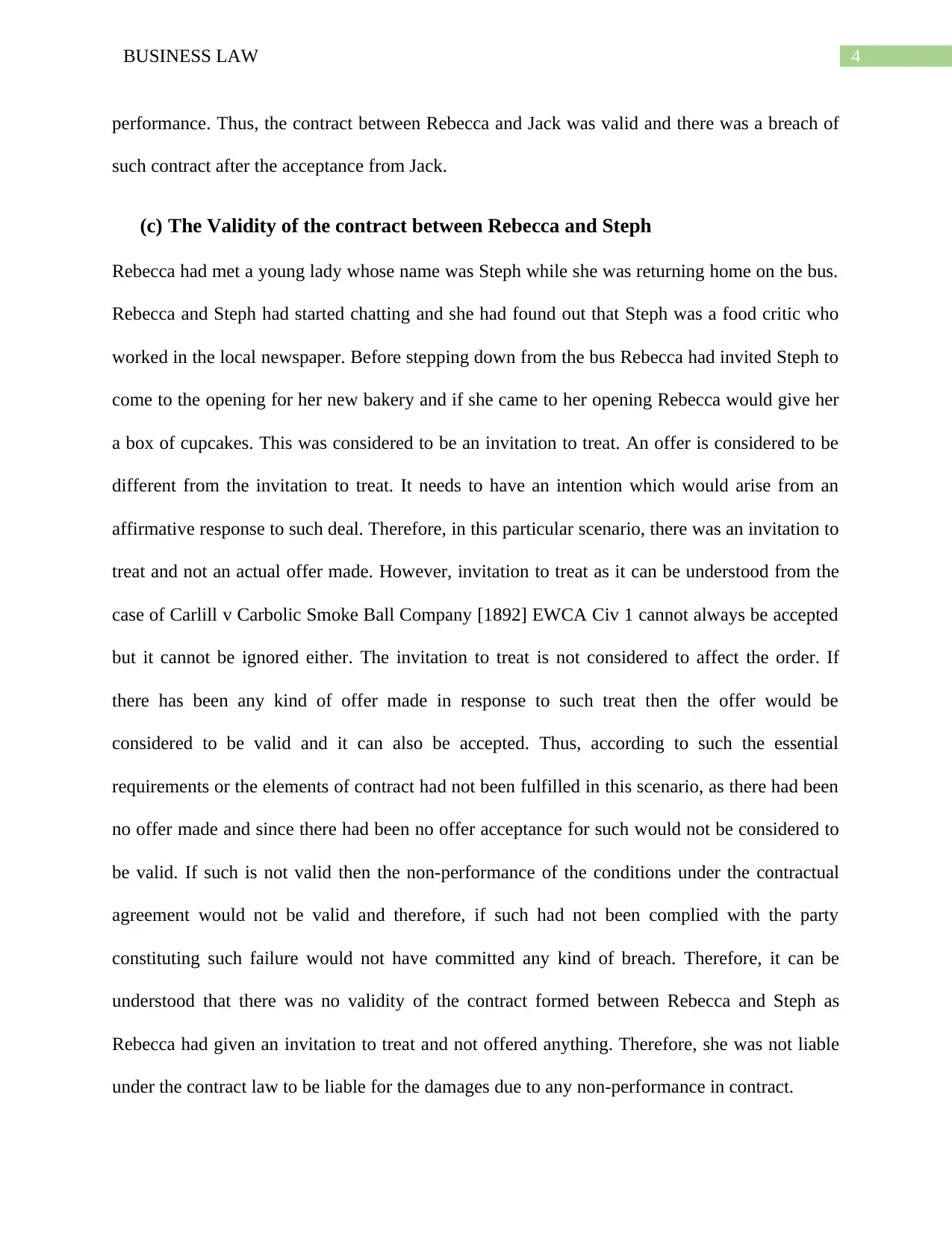
4BUSINESS LAW
performance. Thus, the contract between Rebecca and Jack was valid and there was a breach of
such contract after the acceptance from Jack.
(c) The Validity of the contract between Rebecca and Steph
Rebecca had met a young lady whose name was Steph while she was returning home on the bus.
Rebecca and Steph had started chatting and she had found out that Steph was a food critic who
worked in the local newspaper. Before stepping down from the bus Rebecca had invited Steph to
come to the opening for her new bakery and if she came to her opening Rebecca would give her
a box of cupcakes. This was considered to be an invitation to treat. An offer is considered to be
different from the invitation to treat. It needs to have an intention which would arise from an
affirmative response to such deal. Therefore, in this particular scenario, there was an invitation to
treat and not an actual offer made. However, invitation to treat as it can be understood from the
case of Carlill v Carbolic Smoke Ball Company [1892] EWCA Civ 1 cannot always be accepted
but it cannot be ignored either. The invitation to treat is not considered to affect the order. If
there has been any kind of offer made in response to such treat then the offer would be
considered to be valid and it can also be accepted. Thus, according to such the essential
requirements or the elements of contract had not been fulfilled in this scenario, as there had been
no offer made and since there had been no offer acceptance for such would not be considered to
be valid. If such is not valid then the non-performance of the conditions under the contractual
agreement would not be valid and therefore, if such had not been complied with the party
constituting such failure would not have committed any kind of breach. Therefore, it can be
understood that there was no validity of the contract formed between Rebecca and Steph as
Rebecca had given an invitation to treat and not offered anything. Therefore, she was not liable
under the contract law to be liable for the damages due to any non-performance in contract.
performance. Thus, the contract between Rebecca and Jack was valid and there was a breach of
such contract after the acceptance from Jack.
(c) The Validity of the contract between Rebecca and Steph
Rebecca had met a young lady whose name was Steph while she was returning home on the bus.
Rebecca and Steph had started chatting and she had found out that Steph was a food critic who
worked in the local newspaper. Before stepping down from the bus Rebecca had invited Steph to
come to the opening for her new bakery and if she came to her opening Rebecca would give her
a box of cupcakes. This was considered to be an invitation to treat. An offer is considered to be
different from the invitation to treat. It needs to have an intention which would arise from an
affirmative response to such deal. Therefore, in this particular scenario, there was an invitation to
treat and not an actual offer made. However, invitation to treat as it can be understood from the
case of Carlill v Carbolic Smoke Ball Company [1892] EWCA Civ 1 cannot always be accepted
but it cannot be ignored either. The invitation to treat is not considered to affect the order. If
there has been any kind of offer made in response to such treat then the offer would be
considered to be valid and it can also be accepted. Thus, according to such the essential
requirements or the elements of contract had not been fulfilled in this scenario, as there had been
no offer made and since there had been no offer acceptance for such would not be considered to
be valid. If such is not valid then the non-performance of the conditions under the contractual
agreement would not be valid and therefore, if such had not been complied with the party
constituting such failure would not have committed any kind of breach. Therefore, it can be
understood that there was no validity of the contract formed between Rebecca and Steph as
Rebecca had given an invitation to treat and not offered anything. Therefore, she was not liable
under the contract law to be liable for the damages due to any non-performance in contract.
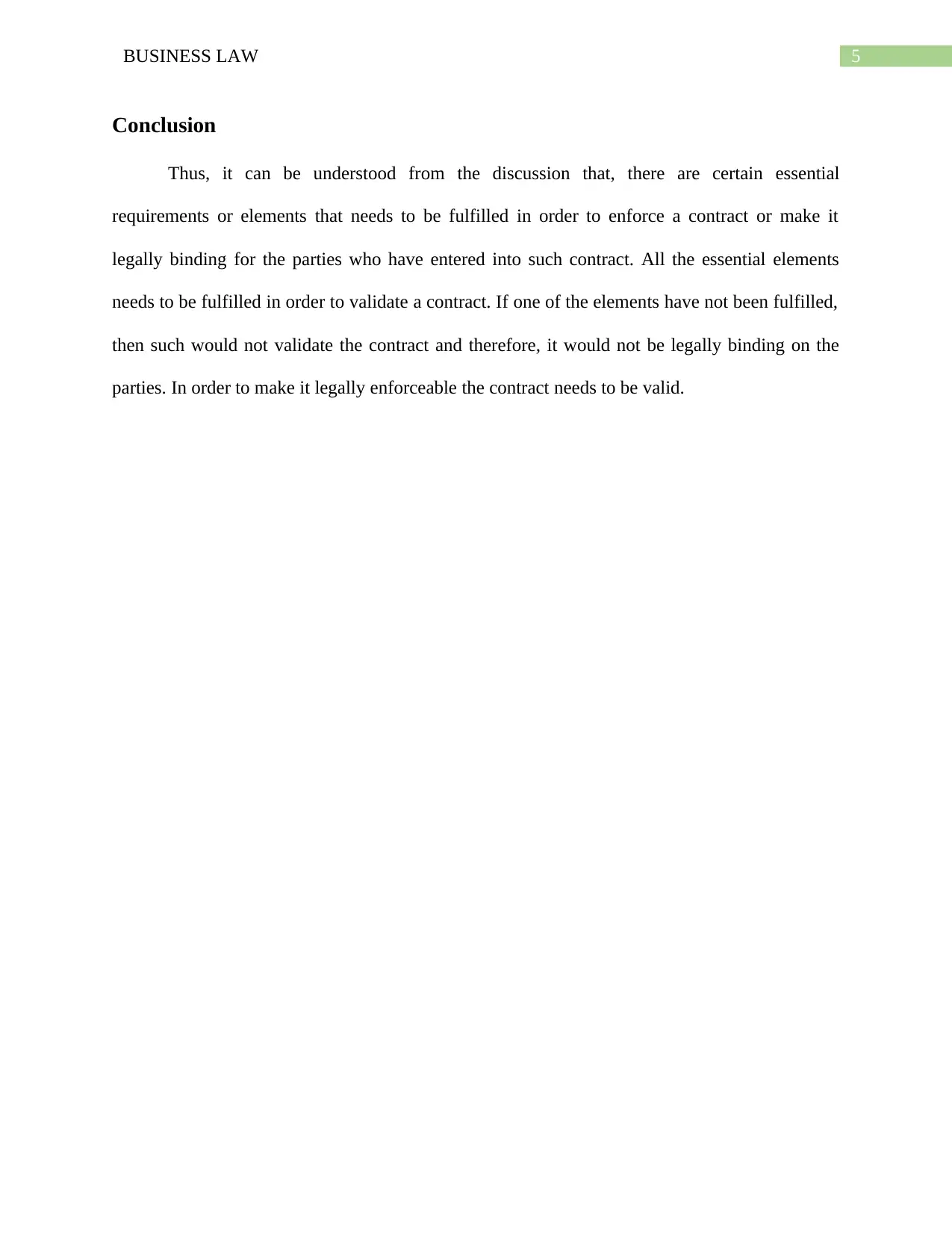
5BUSINESS LAW
Conclusion
Thus, it can be understood from the discussion that, there are certain essential
requirements or elements that needs to be fulfilled in order to enforce a contract or make it
legally binding for the parties who have entered into such contract. All the essential elements
needs to be fulfilled in order to validate a contract. If one of the elements have not been fulfilled,
then such would not validate the contract and therefore, it would not be legally binding on the
parties. In order to make it legally enforceable the contract needs to be valid.
Conclusion
Thus, it can be understood from the discussion that, there are certain essential
requirements or elements that needs to be fulfilled in order to enforce a contract or make it
legally binding for the parties who have entered into such contract. All the essential elements
needs to be fulfilled in order to validate a contract. If one of the elements have not been fulfilled,
then such would not validate the contract and therefore, it would not be legally binding on the
parties. In order to make it legally enforceable the contract needs to be valid.
⊘ This is a preview!⊘
Do you want full access?
Subscribe today to unlock all pages.

Trusted by 1+ million students worldwide
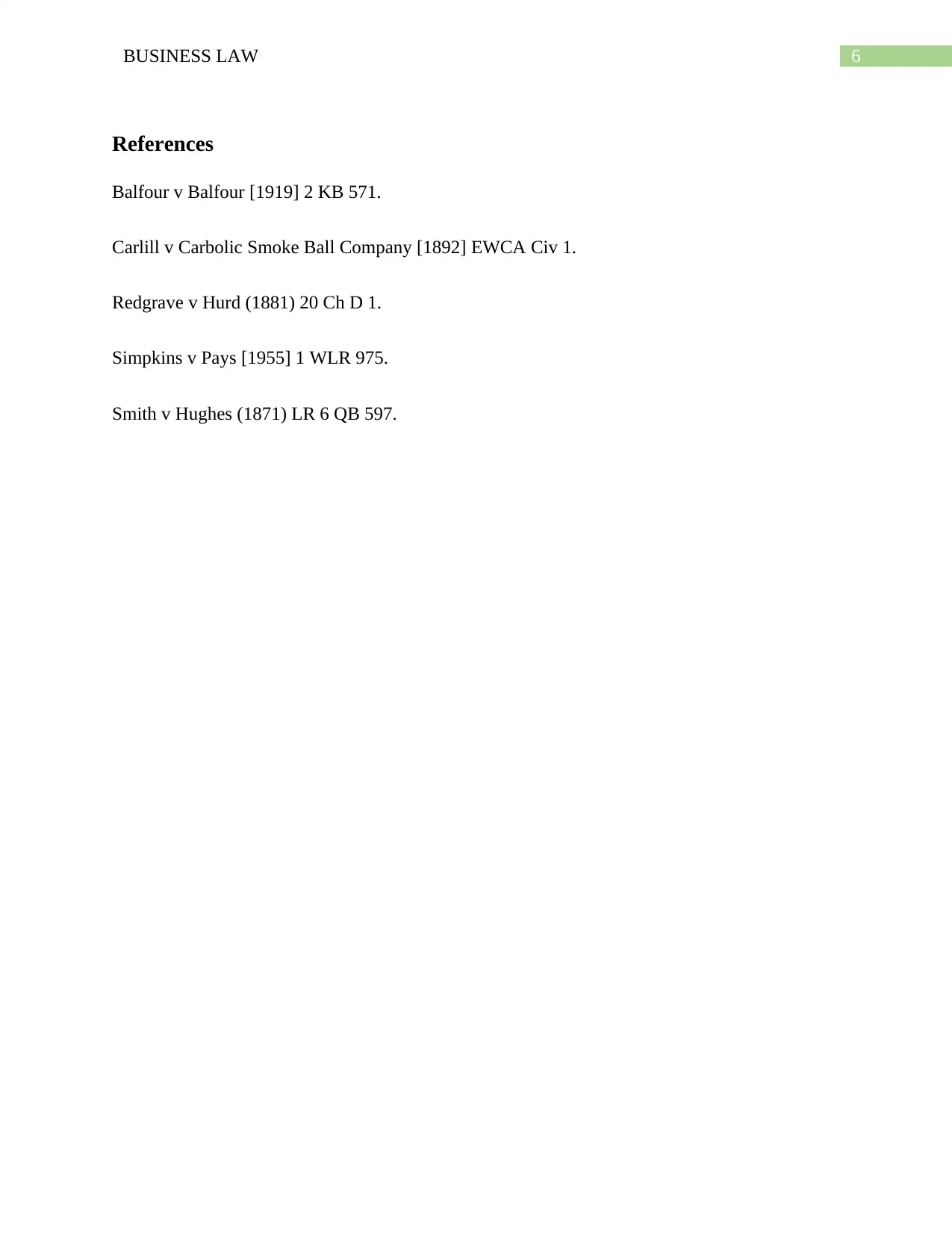
6BUSINESS LAW
References
Balfour v Balfour [1919] 2 KB 571.
Carlill v Carbolic Smoke Ball Company [1892] EWCA Civ 1.
Redgrave v Hurd (1881) 20 Ch D 1.
Simpkins v Pays [1955] 1 WLR 975.
Smith v Hughes (1871) LR 6 QB 597.
References
Balfour v Balfour [1919] 2 KB 571.
Carlill v Carbolic Smoke Ball Company [1892] EWCA Civ 1.
Redgrave v Hurd (1881) 20 Ch D 1.
Simpkins v Pays [1955] 1 WLR 975.
Smith v Hughes (1871) LR 6 QB 597.
1 out of 7
Related Documents
Your All-in-One AI-Powered Toolkit for Academic Success.
+13062052269
info@desklib.com
Available 24*7 on WhatsApp / Email
![[object Object]](/_next/static/media/star-bottom.7253800d.svg)
Unlock your academic potential
Copyright © 2020–2026 A2Z Services. All Rights Reserved. Developed and managed by ZUCOL.





